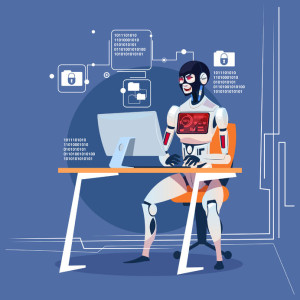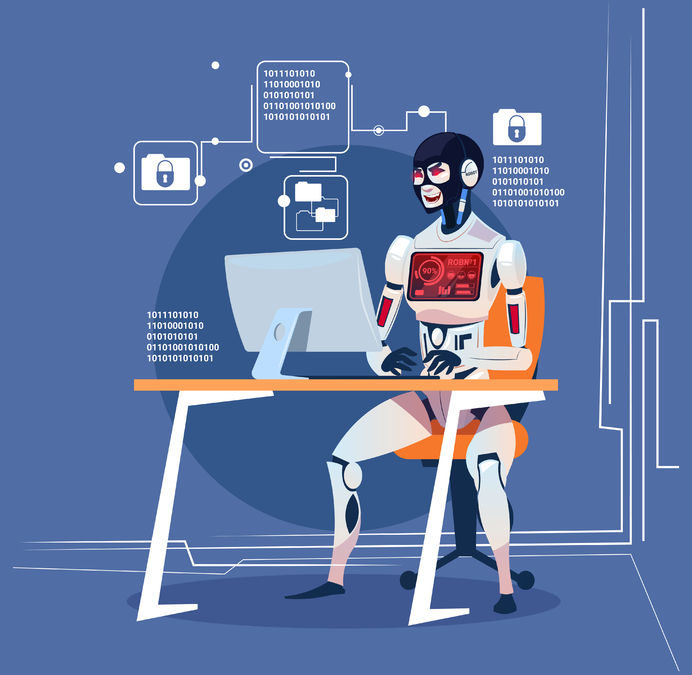 The Founding Fathers probably never saw this coming: A digital era in which humans aren’t the only ones communicating. Set aside your fears of a robot-dominated dystopia for a moment and think about this: Robots and artificial intelligence are increasingly present in online conversations and media, which means free speech considerations are starting to crop up.
The Founding Fathers probably never saw this coming: A digital era in which humans aren’t the only ones communicating. Set aside your fears of a robot-dominated dystopia for a moment and think about this: Robots and artificial intelligence are increasingly present in online conversations and media, which means free speech considerations are starting to crop up.
What does this mean for us? As a recent Slate article argued, now is the best time to start thinking about how we protect (or restrict) speech produced by robots. If we don’t, then our fundamental First Amendment freedoms could be at stake as we interact more online. How do you think we should apply the First Amendment to robotic speech (if at all)? Here are some things we need to critically evaluate in the coming years:
The First Amendment Doesn’t Specify Humans
Although it may seem obvious that the Constitution was written by people, for people, this doesn’t necessarily mean the protections within our country’s legal framework are exclusively limited to humans. Other legal challenges in the U.S. – such as the debate over legal personhood for chimps and apes – and abroad – such as Saudi Arabia granting citizenship to a humanlike robot in 2017 – demonstrate how our modern society is changing its attitudes towards nonhuman beings in our global society.
Should the First Amendment only apply to humans? If the government is forbidden from “abridging the freedom of speech,” then could speech produced by robots and AI be protected as well? A literal reading of the Constitution suggests this might be the case, but it’s ultimately up to citizens and policymakers to decide.
Fundamental Freedoms Are at Stake
A major concern about free speech for robots doesn’t even involve robots – it involves universal protections for fundamental freedoms like speech and expression. If you look at FIRE’s history of free speech records, you’ll find several instances throughout English and American history when the First Amendment was violated for arbitrary reasons, such as Union Army General Ambrose Burnside’s suspension of the Chicago Times in 1893, the 1918 Sedition Act that prevented spoken or written criticism of the U.S. government, and the 1938 ban on Life Magazine after the media organization produced a public health documentary on childbirth.
In the present-day context, First Amendment right violations occur on a regular basis, from school dress codes primarily targeting female students to the suppression of freedom of speech on college campuses. By ignoring the growing issue of robots and free speech, we could be fracturing the universality of free speech protections. Even if we do not give robots and related technologies the right to freedom of expression, we still need to figure out what to do about this matter during a time when thousands of bots are posing as real human beings in online interactions.
Regulating Robots’ Speech is Nearly Impossible
Whether you believe robotic speech derives from human programmers or it comes from robots themselves, the fact of the matter is: regulating bots online would be next to impossible to enforce. There are millions (if not billions) of bots on social media websites, and we do not have the regulatory framework or government funding needed to regulate all instances of robotic speech.
Additionally, how would regulating robotic speech even work? We will never be able to eliminate bots entirely from the Internet, imposing fines wouldn’t work because that would require a human to be directly involved and held accountable, and since bots are mostly anonymous, how could we determine if the bot is programmed by a human or running autonomously?
Ultimately, there’s no clear solution for regulating robotic speech under the First Amendment. It could be that only human beings deserve rights under the law, but it could also be that robots are too widespread online to bother with regulating them (our government simply doesn’t have the billions of dollars needed to do this). So what do you think? Should we restrict robotic speech or grant it protection under the First Amendment?






